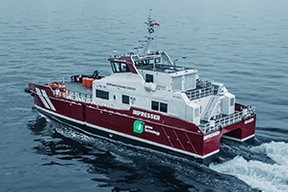Seagull Launches JRC ECDIS Training Module
Norway-based Seagull AS introduced an equipment specific training module for Japan Radio Co Ltd (JRC)’s ECDIS systems.
Developed in close cooperation with JRC, one of the world’s leading ECDIS manufacturers, this latest addition to Seagull’s extensive library of computer-based training (CBT) modules is designed to train navigators in the use of the JRC 701B, 901B and JAN-2000 series ECDIS.
Targeting deck officers, the new course will allow shipowners and operators with JRC ECDIS onboard their ships to meet the recently introduced regulatory requirement for specific training in addition to generic ECDIS training.
Seagull developed a distance learning course, fully approved by JRC, consisting of CBT module 4014 and a specific procedure involving a JRC ECDIS. Course topics include switching on and setting up a JRC ECDIS correctly; confirming that the ECDIS is in fully operational status; and accessing the menu system and man-machine interface. In addition the course will train navigators in how to use the JRC ECDIS most effectively to plan a passage and how to manipulate charts and other information.
Once a seafarer has successfully completed the course Seagull will issue him/her with a course diploma stating that JRC equipment specific training approved by the manufacturer has been undertaken.
Roger Ringstad, Managing Director, Seagull AS, said, “One of the biggest challenges facing shipowners and operators is the need for both generic and equipment specific ECDIS training to comply with the STCW Manila amendments. Companies may have several different systems in their fleet and seafarers will have to have completed the right training each time they join a ship in that fleet. The more systems a company has the more training courses they will have to provide.”
Seagull believes its new course will offer a number of benefits to owners and operators that use JRC ECDIS. Mr Ringstad points out: “Seafarers can take this course either onboard the ship or in a shipping company office ashore. Consequently there is a great deal of flexibility as the training can be carried out at the time and place that is most convenient.”
“Our equipment specific training courses avoid the need for companies to send crew for classroom-based training provided by the manufacturer,” Mr. Ringstad said. “There is only limited space on such courses and therefore some companies sometimes have to wait quite a long time before space becomes available. By using CBT there is no need to book, enabling shipping companies to respond quickly to emerging training needs. There are also benefits in terms of cost, as they do not have to pay for seafarers to travel to attend classroom training courses.”
As well as this portfolio of equipment specific ECDIS training, Seagull has developed two new versions of generic ECDIS training courses following the STCW Manila amendments and revised IMO Model course.
The ECDIS generic classroom course has been launched and the company plans to introduce the generic onboard course as soon as all the necessary approvals have been secured.













